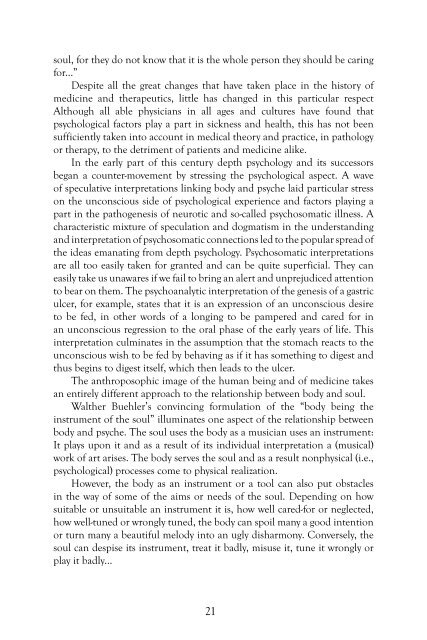When Healing Becomes Educating, Vol. 2 - Waldorf Research Institute
When Healing Becomes Educating, Vol. 2 - Waldorf Research Institute
When Healing Becomes Educating, Vol. 2 - Waldorf Research Institute
Create successful ePaper yourself
Turn your PDF publications into a flip-book with our unique Google optimized e-Paper software.
soul, for they do not know that it is the whole person they should be caring<br />
for...”<br />
Despite all the great changes that have taken place in the history of<br />
medicine and therapeutics, little has changed in this particular respect<br />
Although all able physicians in all ages and cultures have found that<br />
psychological factors play a part in sickness and health, this has not been<br />
sufficiently taken into account in medical theory and practice, in pathology<br />
or therapy, to the detriment of patients and medicine alike.<br />
In the early part of this century depth psychology and its successors<br />
began a counter-movement by stressing the psychological aspect. A wave<br />
of speculative interpretations linking body and psyche laid particular stress<br />
on the unconscious side of psychological experience and factors playing a<br />
part in the pathogenesis of neurotic and so-called psychosomatic illness. A<br />
characteristic mixture of speculation and dogmatism in the understanding<br />
and interpretation of psychosomatic connections led to the popular spread of<br />
the ideas emanating from depth psychology. Psychosomatic interpretations<br />
are all too easily taken for granted and can be quite superficial. They can<br />
easily take us unawares if we fail to bring an alert and unprejudiced attention<br />
to bear on them. The psychoanalytic interpretation of the genesis of a gastric<br />
ulcer, for example, states that it is an expression of an unconscious desire<br />
to be fed, in other words of a longing to be pampered and cared for in<br />
an unconscious regression to the oral phase of the early years of life. This<br />
interpretation culminates in the assumption that the stomach reacts to the<br />
unconscious wish to be fed by behaving as if it has something to digest and<br />
thus begins to digest itself, which then leads to the ulcer.<br />
The anthroposophic image of the human being and of medicine takes<br />
an entirely different approach to the relationship between body and soul.<br />
Walther Buehler’s convincing formulation of the “body being the<br />
instrument of the soul” illuminates one aspect of the relationship between<br />
body and psyche. The soul uses the body as a musician uses an instrument:<br />
It plays upon it and as a result of its individual interpretation a (musical)<br />
work of art arises. The body serves the soul and as a result nonphysical (i.e.,<br />
psychological) processes come to physical realization.<br />
However, the body as an instrument or a tool can also put obstacles<br />
in the way of some of the aims or needs of the soul. Depending on how<br />
suitable or unsuitable an instrument it is, how well cared-for or neglected,<br />
how well-tuned or wrongly tuned, the body can spoil many a good intention<br />
or turn many a beautiful melody into an ugly disharmony. Conversely, the<br />
soul can despise its instrument, treat it badly, misuse it, tune it wrongly or<br />
play it badly...<br />
21
















